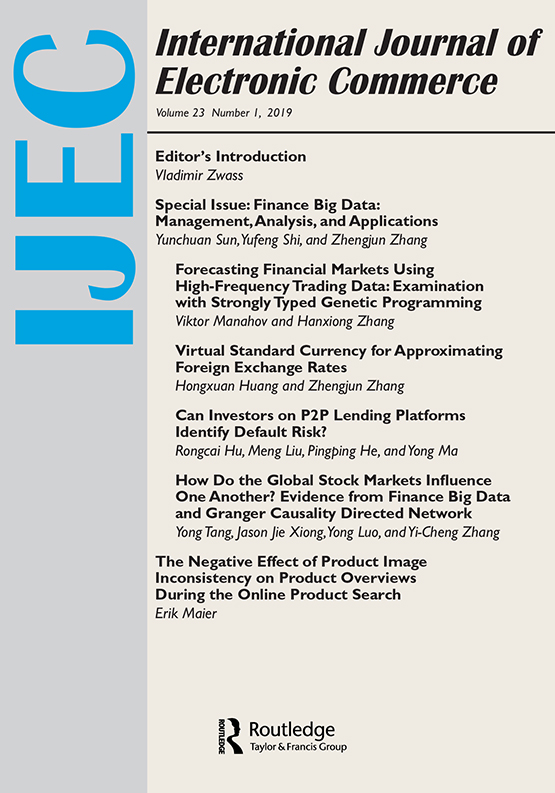编辑器的介绍
IF 3.8
3区 管理学
Q2 BUSINESS
International Journal of Electronic Commerce
Pub Date : 2021-07-03
DOI:10.1080/10864415.2021.1943164
引用次数: 0
摘要
众包,或与公司的外部利益相关者和其他贡献者共同创造价值,在过去二十年中变得越来越重要。在网络生态系统的推动下,众包带来了比任何公司内部都更广泛、更多样的知识和经验库。众包社区的创造力是其实际贡献的关键。在本期《国际电子商务杂志》的开篇,Sut I Wong、Aldijana Bunjak、MatejČerne和Christian Fieseler介绍了他们对众包工作者创造力的一些先决条件的研究。更具体地说,研究人员检查了参与者在数字众筹平台上收到的反馈的作用。他们的理论驱动的经验和分析呈现出一幅高度微妙的画面。反馈实际上可能被视为监视的表现,随之而来的是所有负面结果,包括创造力的下降。与此同时,正如研究人员所表明的那样,负面反馈可以通过众包平台的明确贡献者类别来刺激更好的表现。越来越多在众包平台上寻求创意的公司可能会注意到,作者们会充分考虑他们的发现,讨论如何激发创造力。社交商务平台长期成功的关键是用户参与度。什么平台功能促进了它?这是陈夏雨、刘兆阳、魏少波和刘业正在下一篇论文中提出的研究问题。深入研究,作者的经验旨在回答这样一个问题:哪些平台可供性,被归类为功利性、享乐性和连接性,支持用户的平台感和社会身份,从而促进与平台的互动?这里提供和测试的模型是基于理论的,并为平台提供者提供了规范性建议,以支持作为社交商业企业参与者的不同用户群体,而不仅仅是购物者。网络生活的黑暗面已经成为一个重要的研究领域,因为它越来越多地影响着我们所有人的生活。黑暗面现象之一是对品牌的“协同”网络攻击,即所谓的风暴。此类行为及其对受影响公司的不利影响的例子不胜枚举。很明显,高运行的用户情绪也参与其中,但其性质尚未得到调查。在这里,我们提出这样一个调查。Elena DelgadoBallester、Inés LópezLópez和Alicia Bernal Palazón实证研究了悲伤、愤怒和厌恶在引发网络风暴中的作用。情感评价理论是这部作品的基础。这些细致入微的发现有助于我们理解并——人们希望——应对这种复仇现象。在下一篇论文中,苗翠、辛丽和Ken Kamoche对传统中介向电子中介的数字化转型进行了案例研究。《2021国际电子商务杂志》,第25卷,第3期,261-262https://doi.org/10.1080/10864415.2021.1943164本文章由计算机程序翻译,如有差异,请以英文原文为准。
Editor’s Introduction
Crowdsourcing, or co-creation of value with the firm’s external stakeholders and other contributors, has been gaining in importance over the past two decades. Enabled by the ecosystems of the web, crowdsourcing brings the wider and more diverse pool of knowledge and experience than any firm can muster internally. The creativity of the crowdsourcing community is a key to its actual contribution. Opening this issue of International Journal of Electronic Commerce, Sut I Wong, Aldijana Bunjak, Matej Černe, and Christian Fieseler present their study of some of the prerequisites to the crowdworkers’ creativity. More specifically, the researchers examine the role of feedback received by the contributing participants on the digital crowdwork platforms. Their theory-driven empirics and analysis bring out a highly nuanced picture. Feedback may actually be perceived as an expression of surveillance, with all the negative results ensuing, including diminished creativity. At the same time, as shown by the researchers, negative feedback can serve as a stimulant to better performance by well-defined categories of contributors to the crowdsourcing platforms. The companies that increasingly seek ideas on their crowdsourcing platforms may take heed as the authors discuss how to stimulate creativity in the full light of their findings. The key to the long-term success of social commerce platforms is user engagement. What platform features foster it? This is the research question posed in the next paper, by Xiayu Chen, Zhaoyang Liu, Shaobo Wei, and Yezheng Liu. Drilling down, the authors’ empirics aim to answer the question, What platform affordances, classified as utilitarian, hedonic, and connective, support users’ sense of the platform and social identities, which in turn promote the engagement with the platform? The model offered and tested here is theory based and leads to normative advice to the platform offerors with respect to supporting different groups of their users as participants in the social commerce enterprise, rather than merely shoppers. The dark side of online lives has become an important area of research, simply because it has been increasingly affecting the lives of all of us. One of the phenomena on the dark side is the “collaborative” online attacks on brands, known as firestorms. There are numerous examples of such behavior and of its detrimental effects on the affected companies. Clearly, high-running user emotions are involved, but their nature had not been investigated. Here, we present such an investigation. Elena DelgadoBallester, Inés LópezLópez, and Alicia Bernal-Palazón study empirically the role of sadness, anger, and dislike in initiating an online firestorm. The appraisal theory of emotions serves as the foundation of the work. The nuanced findings help us both understand and—one hopes—contend with this revenge phenomenon. In the next paper, Miao Cui, Xin Li, and Ken Kamoche present a case study in their investigation of the digital transformation of traditional intermediaries into e-intermediaries. INTERNATIONAL JOURNAL OF ELECTRONIC COMMERCE 2021, VOL. 25, NO. 3, 261–262 https://doi.org/10.1080/10864415.2021.1943164
求助全文
通过发布文献求助,成功后即可免费获取论文全文。
去求助
来源期刊

International Journal of Electronic Commerce
工程技术-计算机:软件工程
CiteScore
7.20
自引率
16.00%
发文量
18
审稿时长
>12 weeks
期刊介绍:
The International Journal of Electronic Commerce is the leading refereed quarterly devoted to advancing the understanding and practice of electronic commerce. It serves the needs of researchers as well as practitioners and executives involved in electronic commerce. The Journal aims to offer an integrated view of the field by presenting approaches of multiple disciplines.
Electronic commerce is the sharing of business information, maintaining business relationships, and conducting business transactions by digital means over telecommunications networks. The Journal accepts empirical and interpretive submissions that make a significant novel contribution to this field.
 求助内容:
求助内容: 应助结果提醒方式:
应助结果提醒方式:


